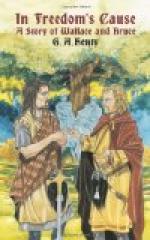No sooner had Wallace retreated than he divided his force into small bands, which proceeded in separate directions, driving off the cattle and destroying all stores of grain, so that in a fortnight after the battle of Falkirk the English army were again brought to a stand by shortness of provisions, and were compelled to fall back again with all speed to the mouth of the Forth, there to obtain provisions from their ships. As they did so Wallace reunited his bands, and pressed hard upon them. At Linlithgow he fell upon their rear and inflicted heavy loss, and so hotly did he press them that the great army was obliged to retreat rapidly across the Border, and made no halt until it reached the fortress of Carlisle.
That it was compulsion alone which forced Edward to make his speedy retreat we may be sure from the fact that after the victory of Dunbar he was contented with nothing less than a clean sweep of Scotland to its northern coast, and that he repeated the same process when, in the year following the battle of Falkirk, he again returned with a mighty army. Thus decisive as was the battle of Falkirk it was entirely abortive in results.
When the English had crossed the Border, Wallace assembled the few gentlemen who were still with him, and announced his intention of resigning the guardianship of Scotland, and of leaving the country. The announcement was received with exclamations of surprise and regret.
“Surely, Sir William,” Archie exclaimed, “you cannot mean it. You are our only leader; in you we have unbounded confidence, and in none else. Had it not been for the treachery of Comyn the field of Falkirk would have been ours, for had the horse charged when the English were in confusion round our squares they had assuredly been defeated. Moreover, your efforts have retrieved that disastrous field, and have driven the English across the Border.”
“My dear Archie,” Wallace said, “it is because I am the only leader in whom you have confidence that I must needs go. I had vainly hoped that when the Scottish nobles saw what great things the commonalty were able to do, and how far, alone and unaided, they had cleared Scotland of her tyrants, they would have joined us with their vassals; but you see it is not so. The successes that I have gained have but excited their envy against me. Of them all only Grahame, Stewart, and Macduff stood by my side, while all the great earls and barons either held aloof or were, like Bruce, in the ranks of Edward’s army, or like Comyn and his friends, joined me solely to betray me. I am convinced now that it is only a united Scotland can resist the power of England, and it is certain that so long as I remain here Scotland never can be united. Of Bruce I have no longer any hope; but if I retire Comyn may take the lead, and many at least of the Scottish nobles will follow him. Had we but horsemen and archers to support our spearmen, I would not fear the issue; but it is




